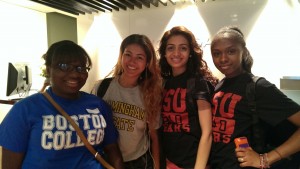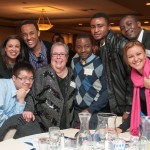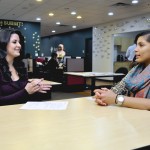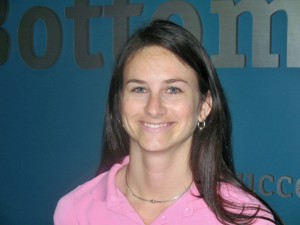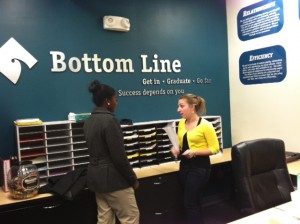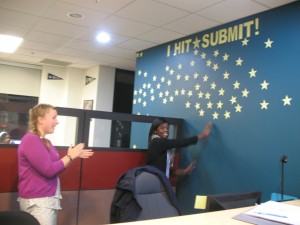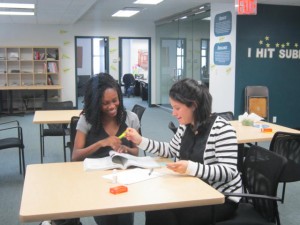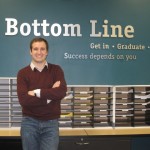
Justin Strasburger – Worcester Site Director
It’s no secret that here at Bottom Line, we love data! In my mind, the best use for our data is to help us evaluate our programs, make necessary adjustments, and ensure the highest quality service for our students. It was with this in mind that, last summer, we took a look at the way we track the services we provide our college students.
Tracking our Success program poses a challenge because each student requires such individualized support. Without good data, it is hard to see patterns that allow us to take a more proactive approach with our students. What we came up with was a system to formalize the services we were providing to students: Success Service Plans. The concept was pretty straightforward: counselors would be able to plan out a semester’s worth of goals and corresponding services for each student and track them in our database. This allows counselors to think ahead and keep track of any follow up that needs to happen.
The Service Plan system we developed also provides us with a huge amount of data to better understand our students’ needs and our program’s capacity to meet these needs. A good example of this is the way we plan out campus visits. In the past, we have planned campus visits by school year and DEAL (Degree, Employability, Aid, and Life) color status (Green, Yellow, and Red).
We allocated roughly three in-person meetings for 1st year students and students who were Red or Yellow. Typically, we had two in-person meetings with Green students. While this has never been set in stone, this assumption was necessary from a planning standpoint so that we could allocate our time appropriately. We all recognized that it was not as simple or clear-cut as saying that all students get two or three on-campus visits. Some may need more in-person meetings, while some may need less (but potentially more follow-up services). Without clear data, though, it was difficult for us to know if these assumptions made sense. Introducing Success Service Plans for each student has allowed us to truly move our program away from a one-size-fits-all approach.
While we are still completing our biannual assessment process, I have began to run some reports to see what the Success Service Plan data can tell us about the Fall 2012 semester. Here is what I found:
¨ Bottom Line’s 1,391 Success students (this does not include students who are currently not assigned to a counselor) received 8,876 total services, an average of 6.38 services per student.
¨ Of these services, 5,523 (or 59%) were in-person services (either occurring on campus or in our offices). This is a per student average of 3.76 in-person services (already above the 3 campus visits we have planned for our neediest students).
¨ The percent of total services provided by class year, is pretty close to the percent of total students by class year with the exception of Seniors. For example, 1st years account for 36% of Bottom Line’s students and accounted for 38% of the total services. Seniors account for 12% of Bottom Line’s students but accounted for only 6% of the total services. This is not terribly surprising as part of our work with Seniors is to help them become more self-reliant. This means that they likely required less follow-up services.
¨ Our Red (22%) and Yellow (22%) students received far more in-person services than Green students (14%). On average Red students had 4.51 in-person services and Yellow students received 3.79 in-person services. This information will help us to better plan out our campus visit needs.
I also took a look at services completed by college attending. To avoid small sample sizes, let’s consider colleges where Bottom Line has at least 25 students. We have 18 schools that fit this description: 10 public and 8 private. Despite this fairly even distribution of public vs. private schools, services were not as evenly distributed. The top 6 schools in terms of average services provided per student are all public schools. This is likely due to a higher concentration of Red, Yellow, and 1st year students at these schools. We can use this information to potentially allocate more time to a school like UMass-Lowell, where students required an average of 5.31 in-person services, than a school like Northeastern University, where students required an average of 2.66 in-person services. It also shows that we need to do further analysis to make sure we are adequately serving all our students.
In a lot of ways, this data confirms our assumptions. It is important, however, that we are not working off of assumptions and instead base our plans off of data. This body of information becomes increasingly valuable as Bottom Line continues to grow. As we expand into new markets and grow the number of students we are working with, thoughtful planning will be very important. While moving to the Service Plan system took some adjusting, I am confident that it will continue to prove a useful tool for counselors to more thoughtfully plan out their semesters, and for management and program development teams to better plan our curriculum and program implementation.
Justin Strasburger
Worcester, MA- Site Director
Bottom Line, campus, career services, college, college advising, College Success, data, FAFSA, higher education, persistence, senior year, Worcester
